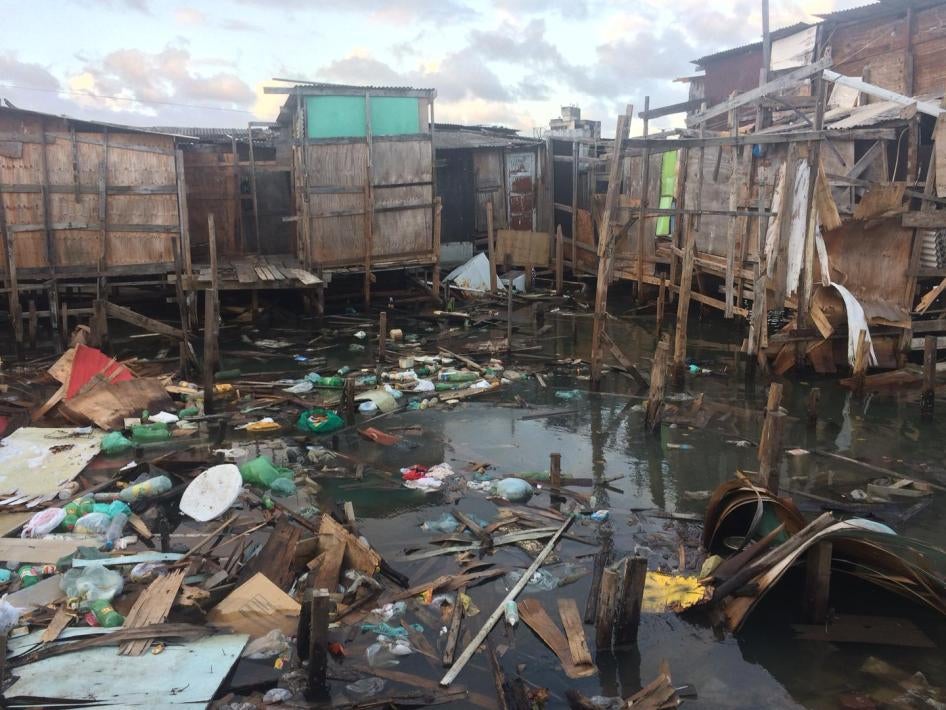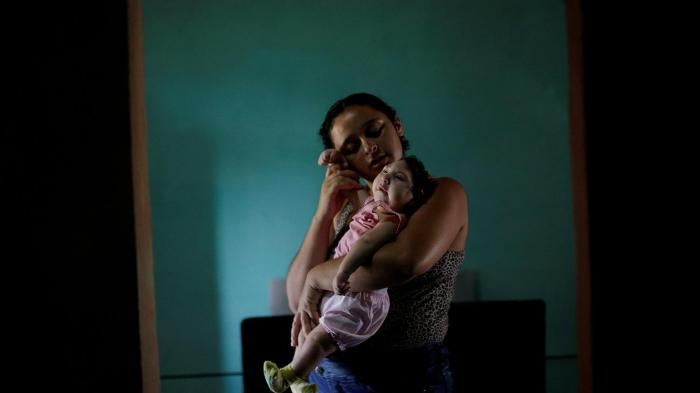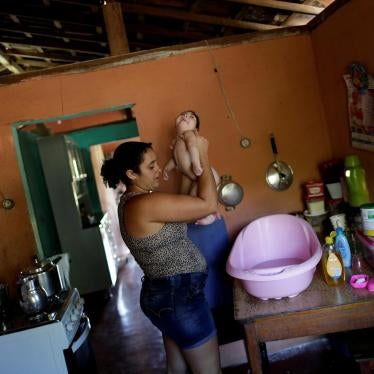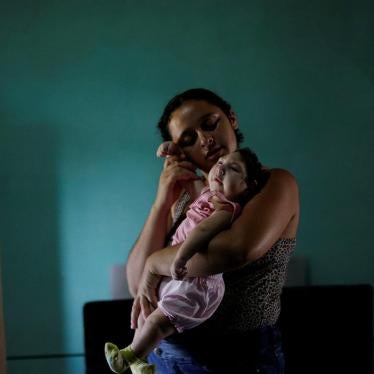Teenage girls are the forgotten victims of Brazil’s Zika outbreak. The virus, transmitted by mosquitos, leaves many babies of mothers infected during pregnancy with lifelong disabilities that require constant care. Because teenage girls in Brazil don’t always get the information they need to prevent pregnancy and have very limited access to abortion in the case of unplanned pregnancy, many of the mothers of children affected by Zika are very young.
One muggy October evening last fall in Paraíba State, Brazil, a round-faced 17-year-old girl—let’s call her Thaís—handed off her 8-month-old daughter to her mother, and turned to talk to me. Thaís gave birth to a baby with Zika syndrome in January 2016, just two months after authorities in Brazil started tracking an unprecedented increase in the number of infants born with microcephaly, a condition in which the baby’s head is smaller than expected, often accompanied by problems with brain development.
As we sat in the living room of the modest home she shares with her partner, she told me her pregnancy was not planned. Like many people infected with Zika, Thaís never had symptoms of the virus during her pregnancy. However, she lives in a community with longstanding water and sanitation problems. Thaís and her partner only have access to tap water three days a week, so they store water in huge containers.
Mosquitos can breed in stored water if it is not properly covered and maintained. Thaís was careful to cover her water containers, but she lived near an open sewage channel full of dirty, standing water—ideal conditions for mosquito breeding.
“We have a lot of mosquitos,” she told me. “The sewage is not covered, and at night it’s full of mosquitos.” She did not know she had been infected with Zika until after the baby was born. Children born with Zika syndrome, like Thaís’s daughter, often have seizures, difficulty eating, problems with vision and hearing, and other complications.
Zika has already spread to the United States. Mosquitos in parts of Florida and Texas carry the virus and can transmit it to humans. It can also be transmitted sexually, in the US often by people returning from trips to Zika-affected countries. Brazil’s Zika crisis showed just how quickly the virus can spread in the right conditions. The outbreak in Brazil is linked to the birthof thousands of children with Zika syndrome.
Thaís stopped going to school when her daughter was born, though she hopes to go back one day. Now she spends her days battling municipal authorities to get transportation so that she can take her daughter to a specialized rehabilitation center. For teenage mothers like Thaís, getting the services their babies need can be especially difficult.
The Brazilian newspaper Estadão reported that roughly one-quarter of the women and girls who gave birth to babies with microcephaly between November 2015 and September 2016 were under age 20. That’s more than 760 adolescent girls and young women—including 35 girls between 10 and 14—now raising children with Zika syndrome.
Thaís was just one of nearly 100 women and girls my colleagues and I interviewed in northeastern Brazil, the center of the Zika outbreak, for a new report. Many of them had similar stories, but what really moved me were the experiences of girls, still children themselves, trying to prevent pregnancy and protect themselves from Zika. Now some of them are raising children affected by the virus.
More than one-third of Brazil’s population lacks access to a continuous water supply, and nearly half is not connected to a wastewater system, according to the latest data—this means raw sewage is going directly into the environment, often close to homes or open waterways. It’s hopeless for anyone, let alone a teenage mother raising a child, to try to battle mosquitos at home when they also have to deal with these pervasive water and sanitation problems in their communities.
Unplanned pregnancies were common among the young mothers we interviewed. Health services often didn’t give them the clear and accessible basic information about reproductive health that they needed. But nearly 20% of births in Brazil are to girls and young women ages 10 to 19—more than 560,000 births per year. A national survey involving nearly 1,000 young women and girls ages 15 to 19 found that 21% were not using any method of contraception, and only 17% had visited a public health clinic to discuss family planning in the 12 months before the survey.
Women and girls told us they felt “disturbed,” “shocked,” or “desperate,” when they found out they were pregnant. Unfortunately, their choices are limited. Abortion is a punishable crime in Brazil, except in cases of rape, when the life of the woman is at risk, or the fetus has anencephaly—a fatal congenital disorder where the brain doesn’t develop. Women are discouraged from even speaking about abortion. Over and over, the women and girls we interviewed told us they felt that they didn’t have any options except continuing their pregnancies—even when they didn’t want to.
Because of this situation, studies show that hundreds of thousands of women and girls in Brazil risk their health and lives to get clandestine—often unsafe—abortions each year. Doctors told us they had treated women and girls in the last year who had turned to unsafe methods to try to induce abortion. Some of them tried to induce abortion by placing water purification chemicals in their vaginas, causing bleeding ulcerative sores.
More than 900 women have died from unsafe abortion in Brazil since 2005, according to Ministry of Health data. One out of every six of those deaths between 2011 and 2015 was a girl, as young as 10, or a teenager.
One young woman told me she was raped when she was 13, and took pills she bought at a pharmacy to terminate the pregnancy. At the time, she didn’t know that because she was raped she probably could have had a legal abortion. “I didn’t have a lot of information,” she said. “I didn’t know what I could do. I didn’t even tell my mother.” After taking the pills, she experienced heavy bleeding to the point that her clothing was soaked with blood, she told me, shifting in her chair as she spoke. She managed to terminate the pregnancy, but as she described what happened, I kept thinking that she was only 13. Imagine how scared she must have felt; bleeding excessively, not knowing what to do, and afraid to tell anyone.
Being a teenage girl is hard, anywhere. Being a teenage girl without reproductive choices is even harder. Being a teenage mother of a child with Zika syndrome, without adequate support from the government—that’s inexplicably tough. That’s what Thaís and other girls confronting the impacts of the Zika virus outbreak are: warriors, “guerreiras,” as one father called them.
The families raising children with Zika syndrome in Brazil are fighting for the support and services their families need. They struggle to pay for expensive medicines, get to urban centers for services for their children, and continue work or school. One mother told us, “If we don’t go after things, fight for them, there is nothing.” But no one, especially children like Thaís, should have to fight so hard to live or to raise a child safely and with dignity.
The authorities in Brazil should make long overdue investments in water and sanitation infrastructure, provide women and girls with comprehensive reproductive health information and services, decriminalize abortion, and ensure children with Zika syndrome have long-term access to services.
Additionally, the U.S. and other countries should look at what went wrong in Brazil to stop the next Zika crisis from happening.











